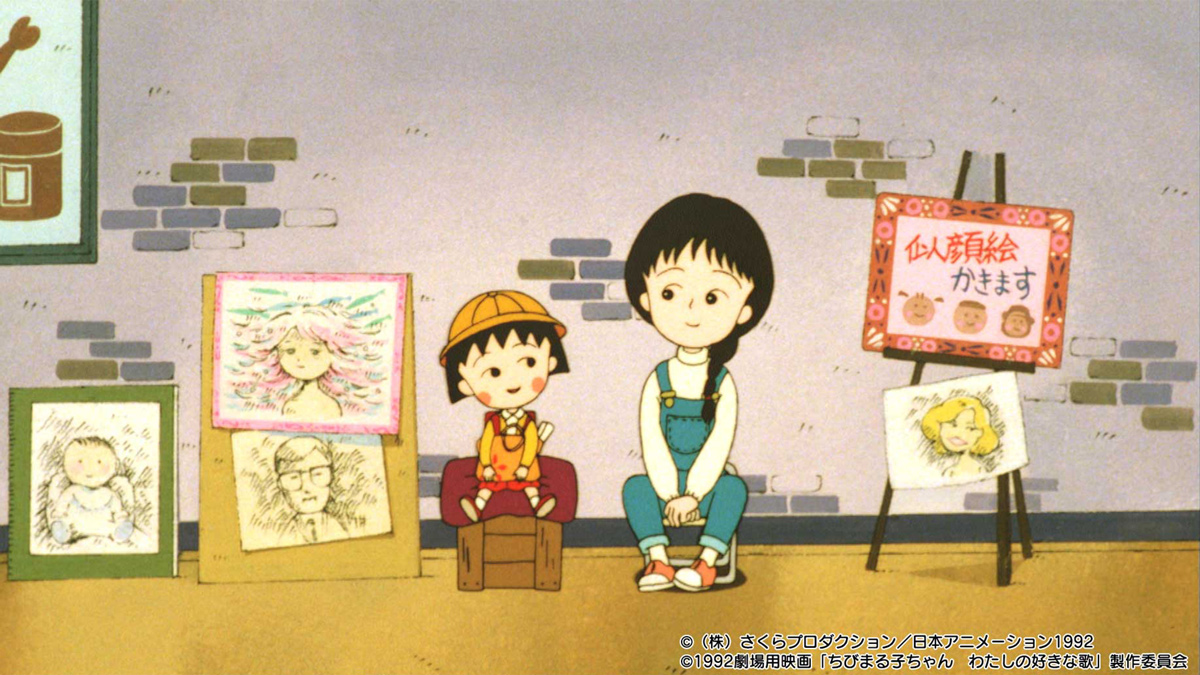
(C) Sakura Production Co., Ltd./Japan Animation 1992 (C) 1992 Theatrical movie “Chibi Maruko-chan: My Favorite Song” Production Committee
“Chibi Maruko-chan: My Favorite Song” What’s in the legendary music anime, Part 2
The influence of war emerges as a hidden theme
When thinking about the work ``Chibi Maruko-chan,'' there are some important things to keep in mind. The serialization of the original manga began in 1986. It was made into a TV anime in 1990 (Heisei 2). However, the stories are not set in the same era. Maruko is Momoko Sakura's alter ego, born in 1965, and Momoko Sakura's elementary school days were in the 1970s. The celebrities mentioned in the work are Hideki Saijo, Linda Yamamoto, and Momoe Yamaguchi, who had their heyday in the 1970s, so it would be reasonable to assume that ``Chibi Maruko-chan'' is set in the early 1970s.
Although ``My Favorite Song'' was released in 1992, the story takes place about 20 years earlier in Shimizu City, Shizuoka Prefecture. The early 1970s was the end of the period of high economic growth, and compared to 1992, when Japan had passed through the Heisei bubble, it was a much older era, the Showa era. ``My Favorite Song'' is a movie made 30 years ago during the Heisei era, and at the same time, it must be viewed as a story from 50 years ago during the Showa era.
What I was interested in was how much Momoko Sakura was thinking about ``the position of women in society'' when she wrote ``My Favorite Song.'' It is a very ironic approach to overlap the marriage and the warhorse's departure to war, and one cannot help but feel the fundamental question, ``What is happiness for women?'' What's more, elementary school student Maruko, with images of war in her mind, sends her older sister off with a cheer, like a military girl who knows no other options. Considering the history of women, this inevitably appears to be a distorted and grotesque composition.
The shadow of war is more clearly brought to the fore in the animated movie version than in the original manga version. There is a scene in which Maruko's grandfather, Tomozo, reminisces about ``the farewell party for Mr. Kosaka of Tonari Gumi 33 years ago,'' but unlike the manga version where he wears ordinary clothes, in the anime version he is dressed as a wartime citizen. He is wearing clothes and a sign with the militaristic slogan ``We don't want it until we win'' can be seen in the background.
Also, in the anime version, there is a depiction in which Oishi Sensei, who taught Maruko how to be a " menkoi colt ," is reminded of the farewell to a loved one who is going off to war (in the original story, the character is said to have hinted at parting with a loved one). (However, it does not directly depict that the war was the cause.) By the way, `` Menkoi Kouma '' was created for Kajiro Yamamoto's `` Horses ,'' which was released in 1941, the year the US and Japan started war. Director Yamamoto came up with the idea of a story about the parting between a horse and a girl, and in keeping with the era of militarism, he pushed forward with the project by calling it a ``national policy film depicting the training of military horses.'' `` Menkoi Kouma '' was a hit apart from the movie as a brave song about sending soldiers off to the battlefield.
However, the extent to which Momoko Sakura, who was born 20 years after the end of the war, included an anti-war Arrival in ``My Favorite Song'' is not clear from the materials at hand. However, Momoko Sakura only knew about `` Menkoi Kouma '' from the lyrics of a playful parody song, but when she became an adult, she learned that it was a song of farewell to the military horse, and the image of ``Maruko holding back tears and smiling and cheering'' He says that what came to mind was the big idea for this story. Even in the afterword of the manga version of `` My Favorite Song ,'' he writes, ``It's too sad to live in an era where people live a long life without crying until they are separated forever from their loved ones,'' so I found deep sadness in this song. There seems to be no doubt about that.
What is the curse of “marriage” in the Showa era?

